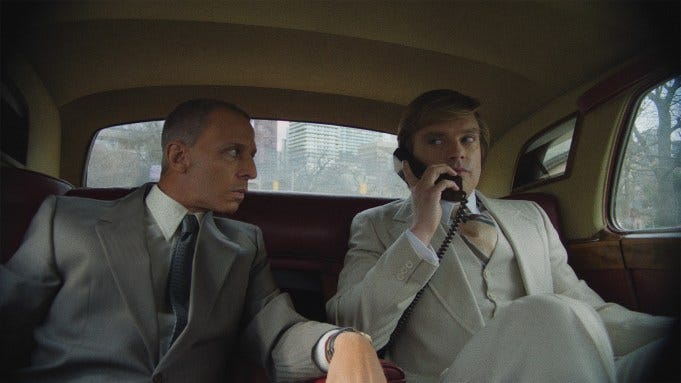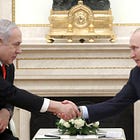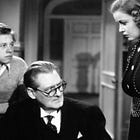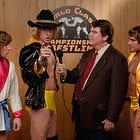The Apprentice
The depicted relationship between Roy Cohn and Donald Trump links law, real estate, and politics, as well as establishing a lineage of the American right running from the 1950s to the present day.

Please support my work by becoming a free or a paid subscriber to the newsletter. Paid subscribers can access my full archive of posts at any time, and are vital to me being able to continue producing and expanding this newsletter.
This post is part of the regular ‘One Take’ series analysing the politics of a film currently showing at the cinemas.
Content warning: Alcoholism; Racism; HIV/AIDS; Misogyny; Antisemitism.
Note: Given that, at time of writing, The Apprentice is still showing in UK cinemas, this analysis only lays out as much of the film’s scenario as is necessary so as to avoid spoilers. It is therefore suitable to be read either before or after watching the film, while hopefully still enriching the viewer’s appreciation of it either way.
The Apprentice begins in 1973, with a young Donald Trump (Sebastian Stan), possessing ambitious ideas for revamping the New York built environment at the point of the city’s apparent physical, economic, and social nadir, but lacking the assurance and reputation necessary to persuade others to back his endeavours. He struggles to escape the shadow and disdain of his real estate magnate father, Fred (Martin Donovan), whose domineering manner is also helping drive Donald’s elder brother, airline pilot Fred Jr. (Charlie Carrick), into deepening alcoholism. With the Trumps facing a federal government investigation for discriminating against African-American tenants, Donald’s luck changes when he falls into the circle of notorious, right-wing lawyer Roy Cohn (Jeremy Strong), whom he convinces to help his family fight the case.
Cohn, a barely closeted gay man, takes a shine to Donald and accepts him as his protégé, introducing him to underhand and illicit methods for undermining his opponents, and teaching him to effuse the necessary bravado to persuade both financial backers and local politicians to support his spectacular real estate projects. Donald also channels some of this newly found self-confidence into pursuing Czechoslovakian model Ivana Zelníčková (Maria Bakalova), whom he subsequently marries.
As the 1980s commences, Donald’s star continues to rise, his reputation cemented by the completion of his Trump Tower skyscraper in Manhattan, and his behaviour, towards Ivana, his family, and even Cohn, becomes increasingly obnoxious. His former mentor warns him against hubris over his risky investments in developments in Atlantic City and elsewhere. Yet with the AIDS crisis besetting New York’s gay community, Cohn’s own private life and health become an object of greater public scrutiny, and the power dynamic between Donald and himself begins to shift inexorably.
Truth, law, and real estate
Early in their acquaintance, Cohn explains to Donald Trump his three rules for success. ‘The first rule is attack, attack, attack. Rule two, admit nothing, deny everything…Rule three: no matter what happens, you claim victory and never admit defeat.’ Truth for Cohn is subjective, a narrative to control. Law can be bent to one’s will, if one’s will is strong enough, if one is willing to sully their own character with relish rather than shame, break the rules they ostensibly operate within and uphold. He inverts John Adams’ maxim, describing America as a nation of men, not laws, identifying the foibles and weaknesses of one’s potential opponents as the pressure points necessary to ensure favourable outcomes.
Law and property are closely connected, straddling the gap between private wealth and the public interest. Fred Trump Sr.’s line of business means his exercise of personal racial prejudice is a matter of government concern. Donald Trump’s plan to attract finance for the derelict Commodore Hotel requires him to secure a tax break for the project from City Hall, to the outrage of citizens who want the cash-strapped city to use its finances for welfarist purposes. In both cases, Cohn intervenes by blackmailing key decision-makers. The collective interest, the public space of the court or tribunal, can be overridden through private, interpersonal interaction. The legal realists of the 1920s and 1930s assailed the classicist jurisprudence rooted in allegedly objective doctrinairism as effectively aligning the judiciary with the interests of capital.1 Cohn gleefully deploys this insight to ensure those same interests are upheld.
Donald Trump demonstrates the applicability of Cohn’s mantra to the world of real estate more broadly. The regeneration of New York, at the point in the city’s history where both its material reality and popular image are marked by degradation, exacerbated by its slide into bankruptcy, is dependent upon his telling a story about its present and future, and persuading others to quite literally buy into it.2 It is about his cultivating an image of himself as a rare talent who can make that story come true, someone who has the vision and ability to be entrusted with the money of others. To reinforce this point, we are repeatedly shown Trump through the medium of period-style television footage. Obscuring the reality of his own gilded upbringing, he attributes his capacity for dealmaking to another form of inheritance, genetics, while secretly worrying about the ravages of middle age on his physical appearance.
Relationships and contracts
The Apprentice is a film about the nature of relationships, and this is integral to its politics, and the nascent politics of Donald Trump. In a key scene, Cohn takes him to a tailor to fit him for an expensive suit. When Trump protests he cannot afford it, Cohn returns the cheque he had given him for taking the family’s case. ‘You pay me back with your friendship,’ he explains. ‘Okay, quid pro quo. You’ll be a friend to me, I’ll be a friend to you.’
This transactional approach, this viewing of your relationship with other people in terms of what they can do for you, is something that ultimately infuses every aspect of Trump’s behaviour, including towards Cohn. As the power balance shifts between them, Trump increasingly marginalises the man he once fought so anxiously to associate himself with. His response to Cohn’s declining health is a combination of unease and pity; his continued gestures of friendship towards Cohn serve primarily to show onlookers how far their fortunes have diverged. By contrast, Cohn’s relationships are the source of his vulnerability, epitomised by his efforts to care for his sick assistant and lover, Russell Eldridge (Ben Sullivan), and his disappointed expectation that Donald now reciprocate and be a friend to him.
Trump takes a zero-sum understanding of this transactionalism in part because of his family background. His loyalty to his parents and siblings is partial and begrudging, not least because of the weakness and dependency it implies. That weakness is epitomised in his eyes by his brother’s alcoholism, to which he responds with both consternation and disgust. Donald also resents being perceived only as Fred Sr.’s son; he yearns to impress his father, but also to eclipse him. And as his father’s mental faculties decline, so he ultimately seeks to take advantage by leveraging the family’s wealth to his own benefit.
This view of relationships underpins Donald Trump’s misogyny too. He sees women as objects of sexual gratification but also as status symbols, to be obtained accordingly. He uses Cohn’s name to get Ivana and her model friends into an exclusive private members’ club, and subsequently seeks to woo her with talk shows of how there are two categories of men, ‘killers’ and ‘losers’, with him falling into the former category. Cohn intervenes by drawing up a miserly prenuptial agreement, much to Ivana’s disgust. However, Ivana herself is also skilled at utilising her looks, and Donald’s desire for her, to pursue her own career aspirations as an interior designer. She not only refuses to take her suitor’s posturing seriously, but perceives and sympathises with the insecurity and vulnerability behind it. Yet this only serves to provoke Donald’s resentment, and motivates his worst behaviour towards Ivana.
Lineages of the American right
In its depiction of Cohn’s relationship with Donald Trump, The Apprentice captures something of the through-history of the American conservative movement, from the height of the Cold War to the present-day dalliance with fascism. Cohn made his name as a young lawyer in the 1950s through his highly public involvement in the legal persecution of alleged communists. At one point in the film, defending his methods to a mildly shocked Donald, he refers back to his involvement in the 1951 prosecution of Julius and Ethel Rosenberg, culminating in their execution for espionage despite serious doubts over the latter’s guilt. Dismissing the public unease that condemning the mother of young children to death had provoked, he angrily denounces the Rosenbergs’ treachery, using an antisemitic slur in doing so, despite being Jewish himself.
This is of a part with the way Cohn specialises in using evidence of officials’ involvement in same-sex relations to blackmail them – another echo of Red Scare politics – when he is himself gay, and indeed gleaning this information by his participation in the same circles. Alongside this shameless hypocrisy, in keeping with his flexible approach to the truth, he makes occasional displays of outrage, and pronouncements of principle, of his belief in liberty, democracy, and above all America. Sliding between performance and sincerity, we get a glimpse of the psychic needs that such beliefs, rooted in the defence of an imputed status quo, might hold for someone who would otherwise be marginalised by that same order on grounds of their ethnicity and sexuality. This is thrown into sharp relief by Cohn’s physical decline at the point when the staunchly conservative Cold Warrior Ronald Reagan is in the White House (and culpable of doing little to alleviate the AIDS pandemic).
The 1980s, The Apprentice makes clear, is Trump’s era, and we see in his education from Cohn, in his career in real estate, in his personal and professional relationships, the birth of Trump’s own politics. His vision of reviving and regenerating New York – the city’s ‘decline’ strongly associated in the public mind with its increasing racial diversity, and juxtaposed with the Trump family’s discriminatory letting practices – is a dry run of his explicitly racist national revivalist programme. He jokes in The Apprentice about running for president himself as an extension of or deviation from his current career trajectory – nation and presidency as a new potential outgrowth of his personal brand. He assesses political actors – from New York mayor Ed Koch (Ian D. Clark) to the Soviets – crudely in terms of whether he can cut deals with them, of whether they are weak or strong. His learned insistence on always claiming victory, even as his creditors circle, is a harbinger of his impending future bankruptcies in the 1990s and 2000s, and of his denial of the 2020 Presidential Election result.
Earlier in The Apprentice, we see Cohn introduce Donald Trump to Roger Stone (Mark Rendall), the Republican campaigner who would in 2019 be sentenced – and subsequently pardoned by Trump – for his links to and efforts to conceal Russian interference in the 2016 Presidential Election. Later in the film, Stone visits Trump in his office to persuade him to support Reagan’s electoral campaign. Trump fumbles and looks smirkingly at a badge Stone has presented him with, carrying the campaign slogan ‘Let’s Make America Great Again’. It is an overt nod to the connection between Reagan’s politics and those Trump would come to embody some thirty years later, except that whereas the Reagan campaign slogan is an optimistic invitation, a promise of partnership in reversing decline, the Trump version – shorn of the ‘Let’s’ – is more of an anguished demand for such a reversal, the externalisation of agency to bring about, or rather turn back, change in the personage of the individual demagogue.
If you’ve enjoyed this post, you can also show your appreciation by sharing it more widely, recommending the newsletter to a friend, and if you’d like, by buying me a coffee.
You might also enjoy these posts from the Academic Bubble archive:
On legal realism and its eclipse of classical jurisprudence, see:
Samuel R. Olken, ‘The Decline of Legal Classicism and the Evolution of New Deal Constitutionalism’, Notre Dame Law Review, Vol. 89, No. 5 (2014), pp. 2051–2092.
Edward A. Purcell, Jr., ‘American Jurisprudence between the Wars: Legal Realism and the Crisis of Democratic Theory’, American Historical Review, Vol. 75, No. 2. (1969), pp. 424−446.
William Wiecek, The Lost World of Classical Legal Thought: Law and Ideology in America, 1886–1937 (Oxford: Oxford University Press, 1998).
On this period in the city’s history, see see Kim Phillips-Fein, Fear City: New York’s Fiscal Crisis and the Rise of Austerity Politics (New York: Metropolitan, 2017).





I was undecided about seeing this but I think I will go ahead and do it.
Thank you for the analysis!
I may only be able to cope with watching this film once there's some clarity from the election... Sooooo.... 🤷🏼♀️🤦🏻♀️